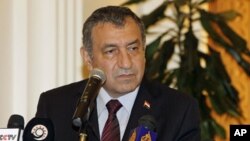Egypt’s prime minister says his just-completed visit to Ethiopia has opened a “whole new environment” for settlement of the longstanding dispute over sharing the waters of the Nile River.
As he completed a two-day visit to Uganda and Ethiopia, Prime Minister Essam Sharaf signaled an end to Egypt’s tepid relations with Sub-Saharan Africa that characterized the Mubarak era.
"The new government in Egypt, we declared very clearly that we believe we are Africans, and African-African relations are very important for our future and the future of the continent," said Sharaf.
Sharaf said his talks with Ethiopian Prime Minister Meles Zenawi and Ugandan President Yoweri Museveni had built an atmosphere of cooperation on a range of issues, beginning with the Nile water dispute.
“What we are doing now is to create a whole new environment for discussions and exchanging ideas," he said.
Egypt has long used two colonial-era treaties as a basis for claiming the vast majority of Nile waters and blocking upstream development. That position has irritated upstream countries, which are on the verge of ratifying a new treaty giving them greater access to the waters for development.
Ethiopia, the source of 85% of the Nile’s flow, recently began construction of a massive hydropower project that will make it an energy exporter.
Sharaf suggested his government sees the Mubarak-era policy as a mistake. “Remember, nobody can prevent a country from applying its development plans and using energy, and using the concept that all should be winners, because you have huge resources, and based on that there will be discussion and an exchange of ideas, and I’m sure the environment has been completely changed.”
Ethiopian officials called Cairo’s new attitude refreshing after years when Egyptian opposition blocked critical financial assistance for Nile development projects.
In a sign of a thaw in bilateral relations, Prime Minister Meles earlier this month agreed to postpone ratification of the new water sharing treaty until Egypt holds fresh elections in the next few months.
Ethiopian foreign ministry spokesman Dina Mufti called Sharaf’s tone a “promising dawn," and “quite a different attitude from the old regime.” He added, however, that lasting change would only be possible once Egyptian voters elect a new government.
Ethiopia-Egypt Talks Yield 'New Environment' in Nile Dispute












